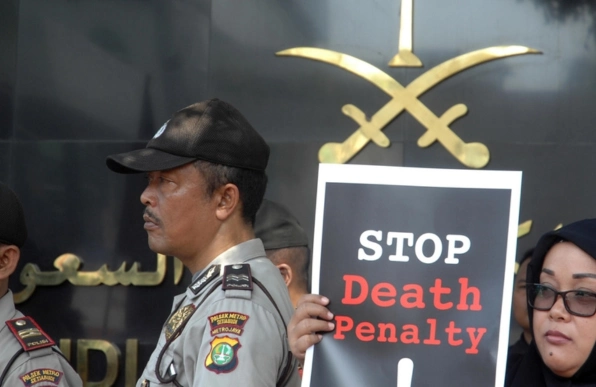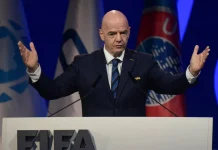The whole country has been in widespread debate since the announcement of Saudi Arabia as the host of the FIFA World Cup 2034. The major issue with this is its use of capital punishment; often public, these executions breach the standards set by human rights around the world, not to mention raising heavy ethical questions on hosting the unifying and celebratory FIFA World Cup in a nation that frequently employs such a policy. This article explores why the use of the death penalty in Saudi Arabia would not be an ideal place to host the FIFA World Cup 2034.
Death Penalty in Saudi Arabia
Saudi Arabia is one of the countries that executes most of its citizens. The death penalty is carried out for most crimes, including murder, drug trafficking, armed robbery, and even actions believed to challenge the monarchy or faith.
Most of these executions are carried out by beheading in most cases and in some public places, an issue that has sparked fierce reactions from international human rights bodies. In 2022, Saudi Arabia executed 196 people, marking the highest annual number in recent years, according to Amnesty International.
The kingdom executed 196 people in 2022, the highest count in recent years. This ominous figure reflects not only reliance on capital punishment but also the harsh interpretation of Sharia law by the state. In public executions that sometimes warn the bystanders, this is meant to deter some but is viewed by others as state-sanctioned violence.
Criticism by Human Rights Groups
Several organizations have argued that the legal processes that lead to executions are not transparent and fair. The trials conducted in Saudi courts are mostly not standard internationally, and the accused often have no access to legal counsel and claims of confessions through torture. Over 70% of trials leading to capital punishment in Saudi Arabia lack international legal standards
Public Executions Criticism
Public executions are even more distressing because they tend to exhibit a display of violence that many view as inhumane and degrading. Such practices stand starkly against the values of fair play, equality, and inclusion that FIFA wants its tournament to convey.
Therefore, the negative impacts of holding the World Cup in a country that performs public executions might relate to the reputation of FIFA as a progressive and socially responsible organization.
Conflicting with the Vision and Values of FIFA
This includes significant attention toward human rights through the years; as evidenced in its statutes and bid standards to host the FIFA World Cup, it expresses that it is supposed to work for betterment through football while it demands a host country that should keep up the stand of human rights.
Awarding the 2034 World Cup to Saudi Arabia does an injustice to the principles that FIFA claims. The imposition of the death penalty inside Saudi Arabia shows a huge contradiction between the human rights record of the country and FIFA’s vision of football as a force for good.
Safety of Players and Fans
The strictness of Saudi Arabia’s laws and punishment may instill fear and uncertainty among players, fans, and journalists who visit. Non-citizens like tourists may even be sentenced to severe punishments for activities that are common or tolerated in other cultures and countries, such as public demonstrations of love or alcohol intake.
Role of LGBTQ Rights
Saudi Arabia’s death penalty includes acts it deems violate its strict interpretation of Islamic law, which includes same-sex relationships. The kingdom opposing LGBTQ+ is in full contrast with FIFA’s endeavor to make football more free and inclusive. Hosting a World Cup in a nation where people are criminalized or executed for being LGBTQ+ sends a horrific message to the world community.
Public Executions: A Spectacle of Repression
Public executions in Saudi Arabia include beheading by sword before an assembled crowd. The government claims this is a form of deterrence, but critics argue that such practices amount to cruel treatment, alienating the kingdom further from international norms.
The psychological effects on people, especially children, who are there to witness such events are very dire. Public executions also create a culture of fear and make violence common; that is the last thing that needs to happen in the grand celebration of the World Cup.
Hosting the World Cup will provide Saudi Arabia with a global platform to project its image of progress and modernity. Critics say this is doing little to improve human rights violations, especially the frequent use of the death penalty.
The Ethical Dilemma for FIFA
Awarding the World Cup to Saudi Arabia would make FIFA complicit in sportswashing. This raises ethical questions regarding the organization’s priorities and whether commercial interests are placed above its commitment to human rights. Saudi Arabia has spent over $8 billion on sports investments, including hosting events and buying stakes in sports entities
Alternatives to Saudi Arabia
There lies a great opportunity for FIFA to change its decision by opting for a host country that would be closer to FIFA’s values. This host country should be strong on human rights and is experienced in hosting such major events. This will bring an opportunity for FIFA to again be the harbinger of equality and fairness via football.
Conclusion
The FIFA World Cup is just something more than a mere game; it is indeed something of unity, diversity, and human potential, an event that unifies not only the participating team representatives but also people throughout the world. The World Cup cannot be held somewhere such as Saudi Arabia, where a record of human rights violations and public executions repeatedly dot its history.
Allowing Saudi Arabia to host the World Cup in 2034 risks tarnishing the reputation of FIFA while alienating fans, players, and sponsors opposed to such practices. The organization needs to consider prioritizing its commitment to human rights and broader implications. This world deserves a World Cup that is aligned with principles of justice, equality, and respect and not shadowed by the specter of oppression and violence.













